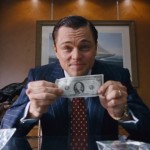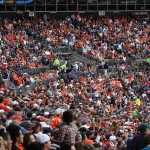I was initially content to let the 56th Grammy Awards pass me by. Until, that is, I learned that the French electronic music duo Daft Punk — who would go on to win four Grammys, including “Album of the Year” and “Record of the Year” — would be performing their hit single “Get Lucky” with Stevie Wonder. The combination seemed like a match made in heaven, and was all the more intriguing given the duo’s enigmatic persona and reticence when it comes to television performances.
Daft Punk have never been shy about their influences or the sense of nostalgia that pervades their music. Their Grammy-winning album, Random Access Memories, is an unashamed (and rather uncommercial) homage to the music that Guy-Manuel de Homem-Christo and Thomas Bangalter (the humans behind the robots) grew up on, e.g., disco, funk, progressive rock, and “classic” rock like Steely Dan and Fleetwood Mac. Or, as Pitchfork‘s Ryan Dombal wrote in his Daft Punk feature:
As true house disciples, the duo have never been shy about their influences. From Homework‘s “Teachers”, a shout-out track in which they literally list their heroes, to the many samples and interpolations that make up Discovery, they’re often at their best while joyously interacting with the past. And RAM, which shuttles between celebratory disco, moody funk, expansive psychedelia, new wave pop, G-funk, and even minimalist trap music, has the same sort of eclectic reach that would be found at legendary clubs like New York’s Paradise Garage, where a normal night could include songs by James Brown, the Police, Steve Miller Band, Talking Heads, and Kraftwerk.
Electronic music, like hip hop, has relied heavily on sampling and utilizing music of the past: famous examples include the “Amen Break” (a foundational element in jungle and drum n’ bass) and the “Funky Drummer Break.” And Daft Punk have been kings of sampling. Over the years, they’ve sampled the likes of The Imperials, Barry Manilow, Barry White, Electric Light Orchestra, and Black Sabbath. Random Access Memories largely eschews any samples, however. Instead, Daft Punk opted for collaborating, in the flesh, with the sort of legendary musicians that they might’ve sampled a few years ago: Giorgio Moroder, Nile Rodgers, Paul Williams, and a host of session musicians.
But as is the case with their sampling, Daft Punk’s live sessions exude an honest affection and yes, generosity. Theirs is not the case of sampling a Barry White beat or using a slick Nile Rodgers guitar lick simply because it sounds “cool” (though they certainly do) or to be merely kitschy about it. There’s an unabashed lack of irony at work Daft Punk’s music: they honestly love their influences, and they want you to love them, too. Which brings us to the Grammy performance.
http://www.youtube.com/watch?v=rgjteE5iJrE
It starts off a bit shakily, but once Rodgers’ guitar gets going, it’s all smooth sailing. And then, at the 2:14 moment, the robots reveal themselves for the breakdown, and the performance launches to another level. The duo show off their DJ skills, mixing in other Daft Punk tracks like “Harder, Better, Faster, Stronger” and “Lose Yourself To Dance,” and then something magical happens. The performance ceases to be just about Daft Punk’s single, and instead, turns into a celebration of the legends also gracing the stage.
There’s a shout-out to “Le Freak” (the signature song Nile Rodgers wrote as a member of Chic) and — in the performance’s most beautiful moment — Stevie Wonder brings it all home with the soulful “Another Star.” It’s a perfect blend of new and old, and it’s telling that Daft Punk remains in the background in a make-shift producer’s booth — letting Wonder, Rodgers, and Pharrell Williams remain the focus.
Considering all of the grandstanding and attention-grabbing that typically dominate award shows, it’s a remarkably generous and — dare I say? — loving gesture to artists that Daft Punk clearly respect. And it paid off, both in terms of the performance itself, which transformed the entire Staples Center into a giant discotheque for a few minutes, and quite literally: “Another Star” got a huge boost on Spotify following the Grammys.
It’s tempting to think that music is becoming increasingly commodified, considering that it’s never been easier to create it or access it. It’s no longer art, but just bits and bytes created on a computer, purchased on a computer, and consumed on a computer. Or, as Daft Punk’s Bangalter put it in the Pitchfork feature:
Technology has made music accessible in a philosophically interesting way, which is great… But on the other hand, when everybody has the ability to make magic, it’s like there’s no more magic — if the audience can just do it themselves, why are they going to bother?
But for one moment, at an awards show as contrived as they come, that notion was overturned. Music was revealed to still be something magical that can bring out the best in us: joy, celebration, and collaboration. And the fact that it took a couple of nostalgia-prone robots to do it… well, that’s just the icing on the cake.















